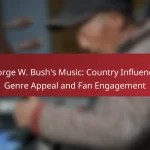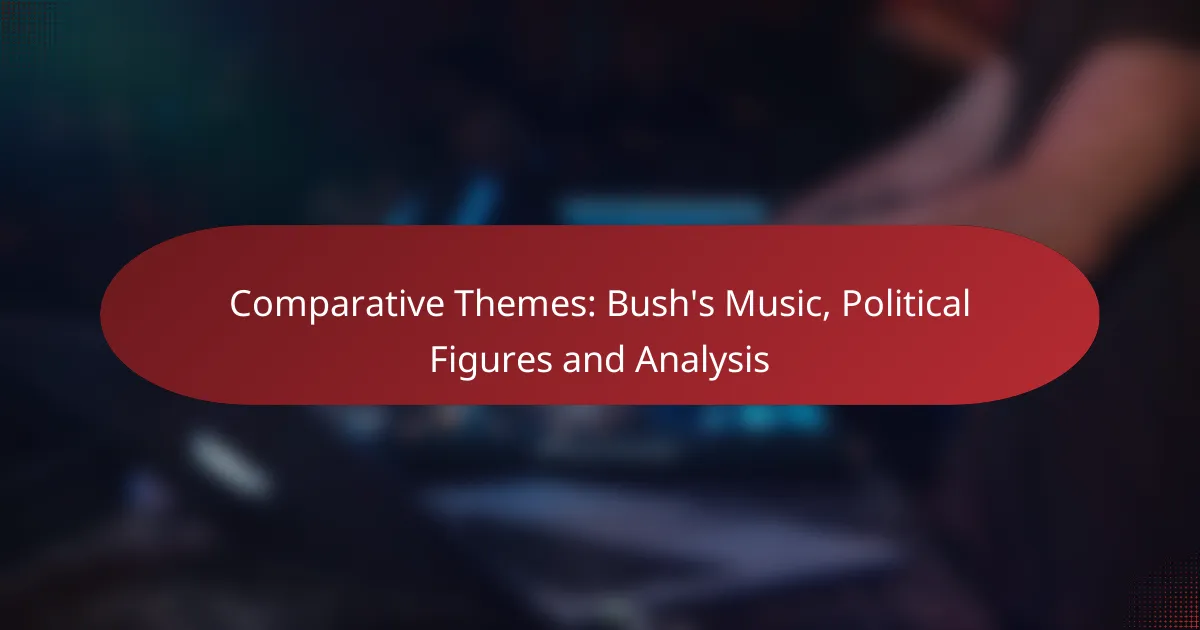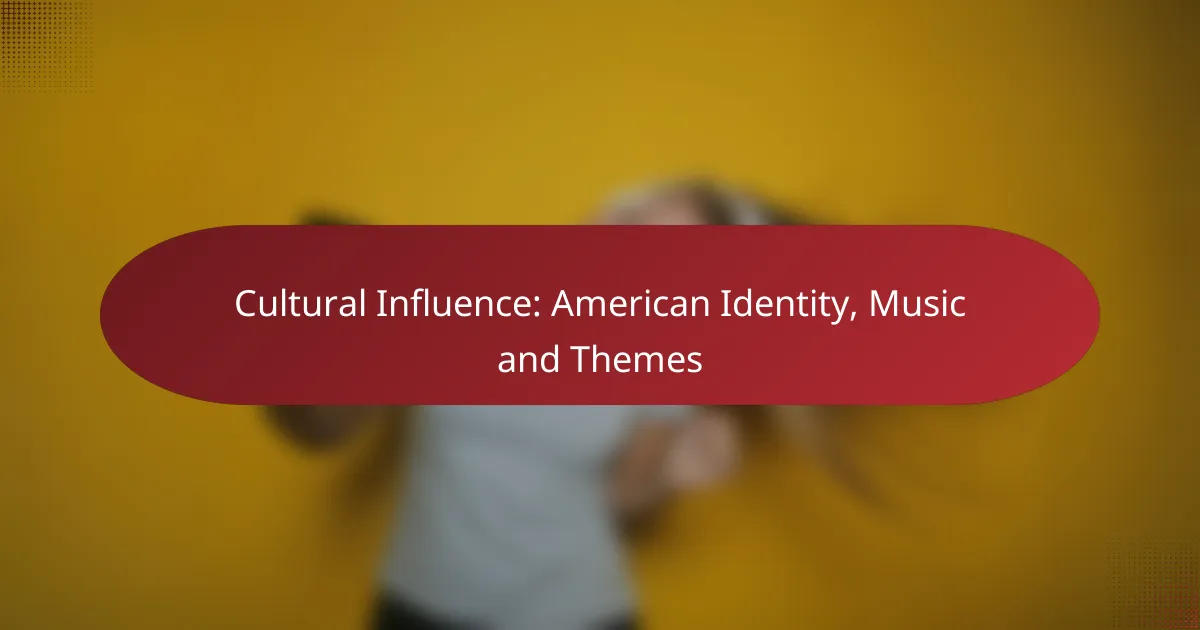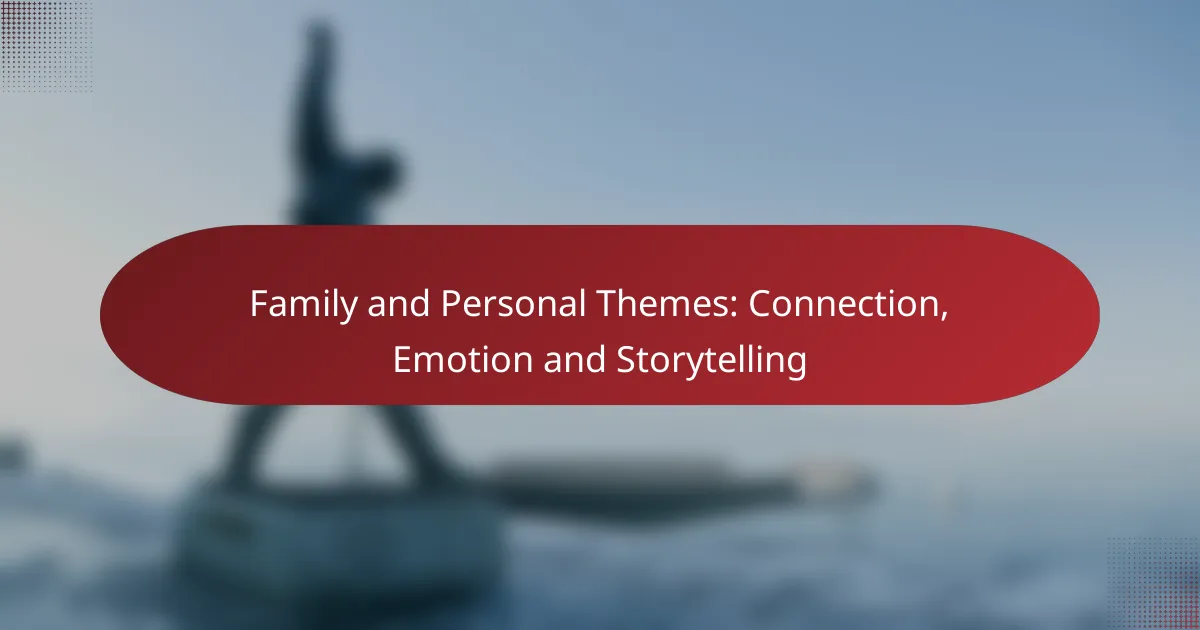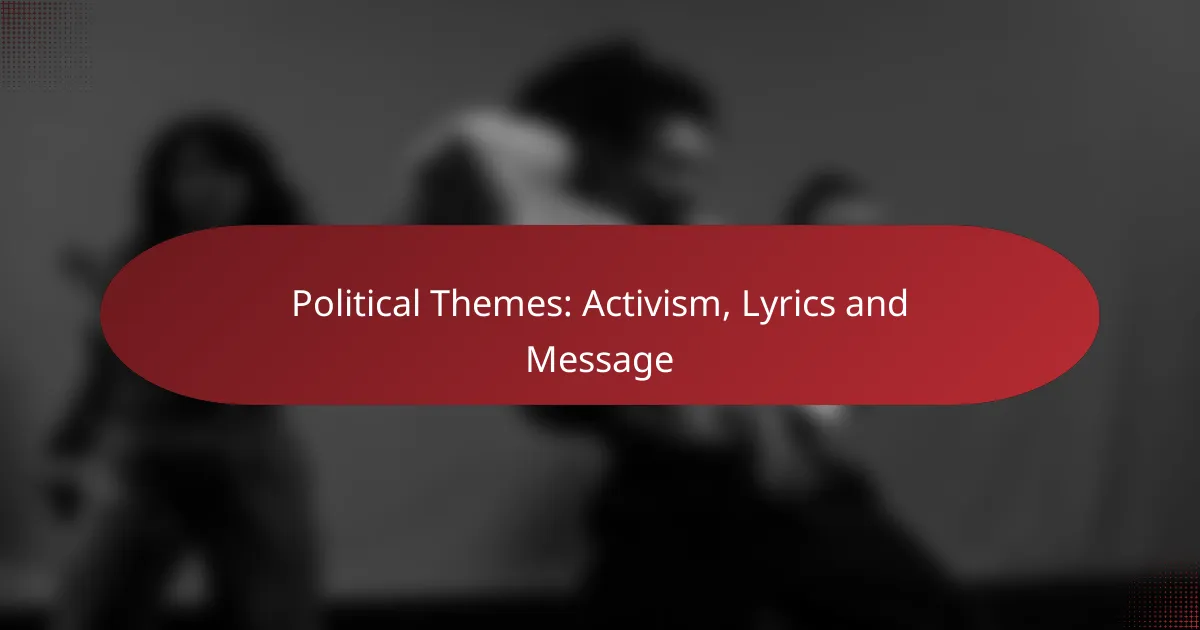Bush’s music serves as a powerful reflection of the political landscape during their time, tackling themes such as war, patriotism, and social issues. By referencing key political figures and events, the band’s lyrics not only comment on leadership but also engage listeners in meaningful discourse about governance and societal challenges. Through their art, Bush has effectively influenced public sentiment and encouraged political engagement among their audience.
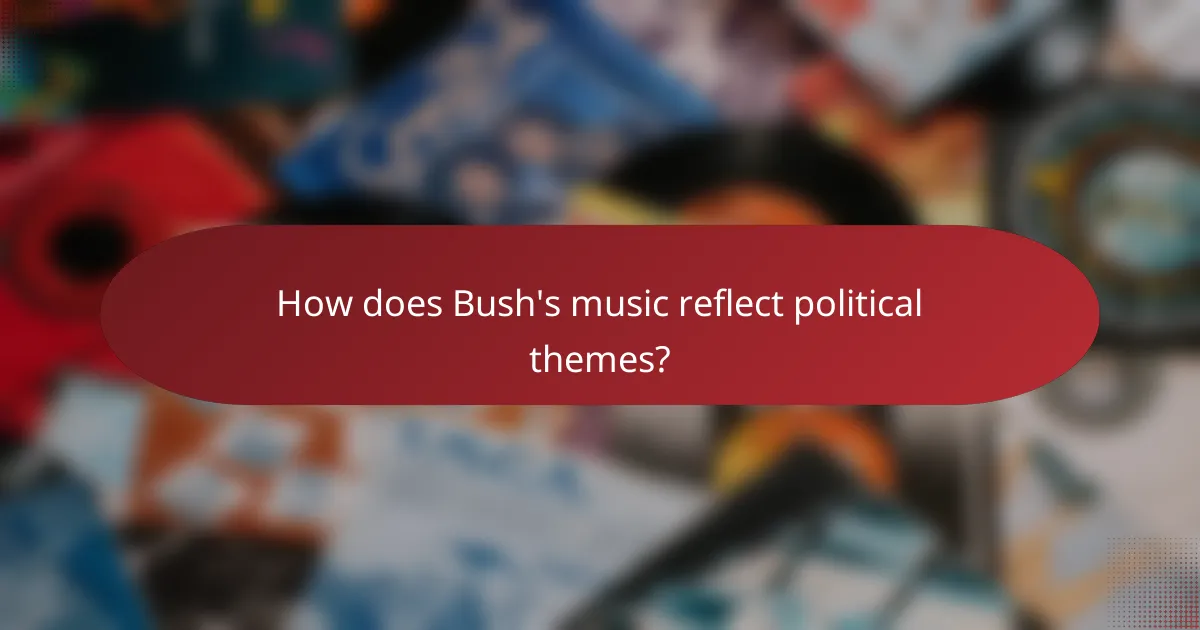
How does Bush’s music reflect political themes?
Bush’s music often mirrors the political landscape of his presidency, addressing themes such as war, patriotism, and social issues. The lyrics and overall tone resonate with the sentiments of the time, providing insight into the public’s mood and the political climate.
Analysis of lyrical content
The lyrical content of Bush’s songs frequently critiques political decisions and societal challenges. For instance, tracks may highlight the struggles of everyday Americans during times of conflict, using vivid imagery to evoke emotional responses. This approach allows listeners to connect personal experiences with broader political themes.
Moreover, Bush employs metaphor and symbolism to convey complex ideas, making the music accessible while prompting deeper reflection on political matters. The use of direct language often enhances the urgency of the messages, urging listeners to engage with the issues presented.
Historical context of Bush’s presidency
During Bush’s presidency, the United States faced significant events, including the September 11 attacks and subsequent wars in Afghanistan and Iraq. These events shaped not only the political discourse but also the themes present in Bush’s music. The atmosphere of fear, resilience, and patriotism influenced the lyrical narratives, reflecting the national sentiment.
The early 2000s were marked by a polarized political environment, with debates over foreign policy and domestic issues. Bush’s music captures this tension, often addressing the divide between different political ideologies and the impact of government actions on citizens’ lives.
Impact on public perception
Bush’s music has played a role in shaping public perception by articulating the frustrations and hopes of many Americans. The emotional weight of the lyrics resonates with listeners, fostering a sense of community among those who share similar views. This connection can influence how political figures are perceived, as music often serves as a reflection of societal values and concerns.
Additionally, the reception of Bush’s music can vary widely, depending on the listener’s political stance. Supporters may find inspiration and validation in the themes, while critics may view the same songs as a critique of government policies. This duality highlights the powerful role of music in political discourse and its ability to mobilize or divide audiences.
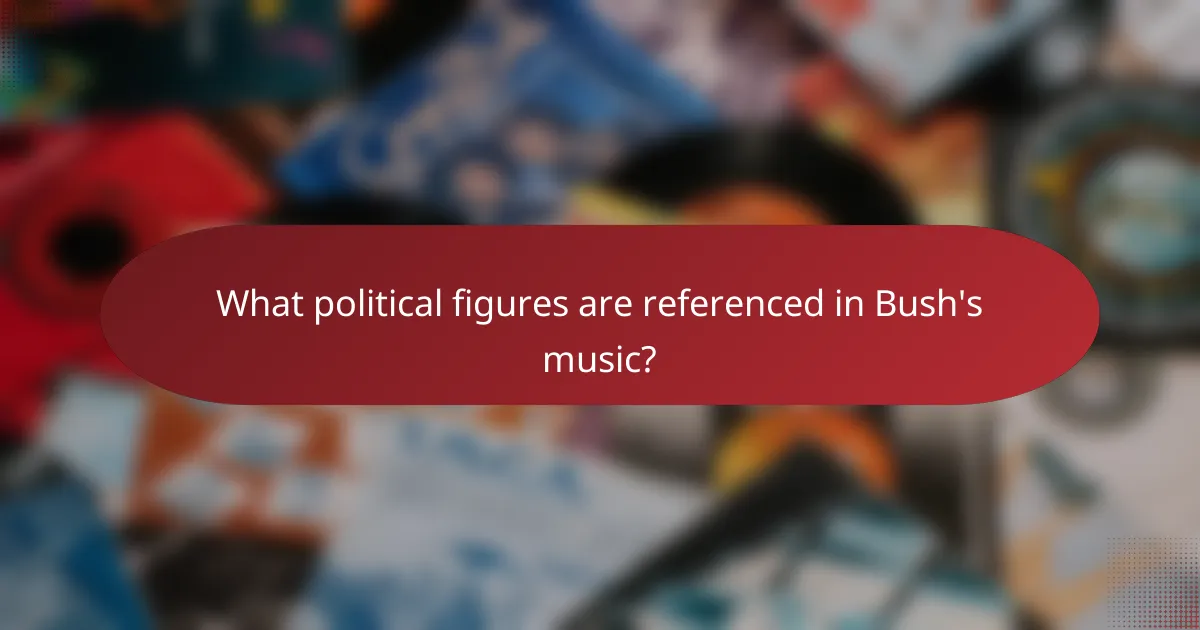
What political figures are referenced in Bush’s music?
Bush’s music often references prominent political figures, particularly those who have shaped the political landscape during their careers. The band’s lyrics reflect commentary on leadership and governance, with notable mentions of George W. Bush, Bill Clinton, and Barack Obama.
George W. Bush
George W. Bush is frequently referenced in Bush’s music, particularly in the context of political decisions and their consequences. The band’s lyrics critique his administration’s policies, especially regarding the Iraq War and domestic issues.
For example, songs may highlight the impact of his presidency on American society and the global stage, often portraying a sense of disillusionment with leadership. This critique resonates with listeners who experienced the political climate during his terms.
Bill Clinton
Bill Clinton’s presidency is another focal point in Bush’s music, often reflecting on the economic prosperity and political controversies of the 1990s. The band’s lyrics may explore themes of scandal and public perception, particularly surrounding Clinton’s impeachment.
Clinton’s approach to governance, including his policies on welfare and healthcare, is sometimes juxtaposed against the challenges faced by his successors. This creates a narrative that examines the complexities of leadership and its long-term effects.
Barack Obama
Barack Obama is referenced in Bush’s music as a symbol of hope and change, contrasting sharply with the previous administrations. The band’s lyrics often celebrate his message of unity and progress while also critiquing the challenges he faced in office.
Obama’s policies on healthcare and social issues are frequently discussed, illustrating the ongoing political debates that continue to shape American society. The band’s commentary reflects both admiration and skepticism, capturing the nuanced views of his presidency.
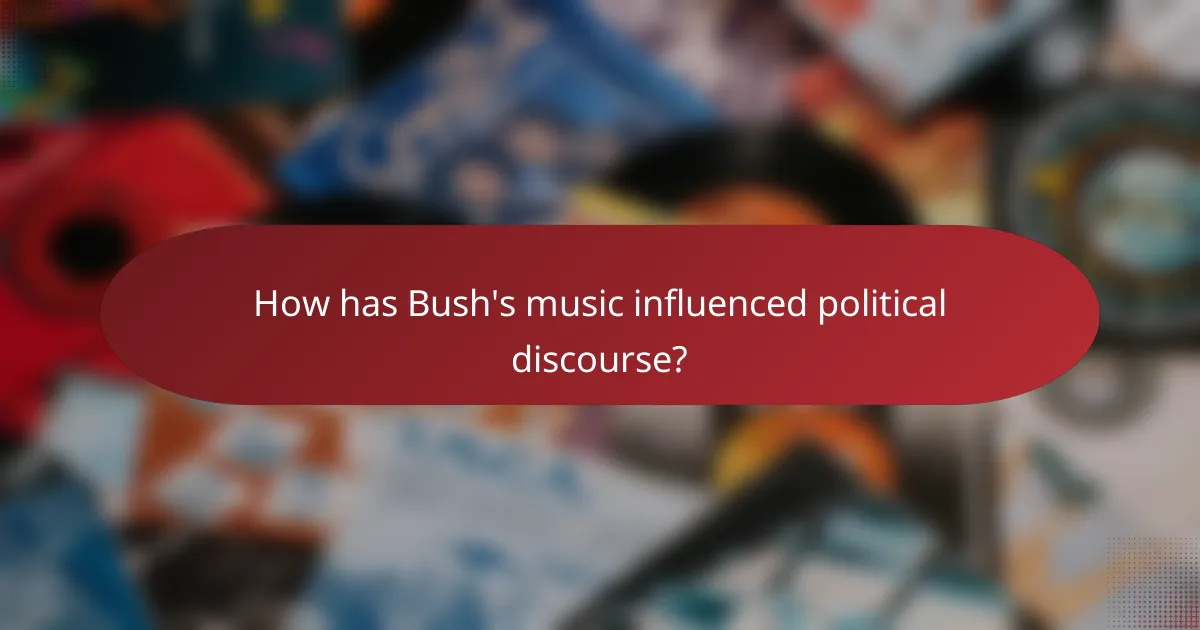
How has Bush’s music influenced political discourse?
Bush’s music has significantly influenced political discourse by providing a platform for social commentary and mobilizing listeners around political issues. Through their lyrics and public performances, Bush has shaped perceptions and encouraged engagement with political themes.
Shaping public opinion
Bush’s music often addresses political and social issues, resonating with listeners and shaping their opinions. Songs that critique government policies or highlight social injustices can sway public sentiment and foster discussions about these topics.
For example, tracks that discuss war or environmental concerns can lead to increased awareness and activism among fans. This influence is particularly evident during times of political unrest, where music becomes a rallying point for collective sentiment.
Role in political campaigns
Political campaigns frequently utilize Bush’s music to evoke emotions and connect with voters. Campaigns may select specific songs to align their message with the sentiments expressed in the music, enhancing their appeal.
For instance, using anthems that promote unity or change can energize supporters and create a memorable association with the candidate’s platform. However, campaigns must be cautious, as misalignment between the song’s message and the candidate’s actions can lead to backlash.
Connection to grassroots movements
Bush’s music has been instrumental in supporting grassroots movements by providing anthems that inspire action and solidarity. Songs that reflect the struggles and aspirations of marginalized communities can galvanize support and encourage participation in social movements.
For example, music festivals and concerts often serve as fundraising events for causes, where Bush’s tracks play a crucial role in uniting attendees around shared goals. This connection fosters a sense of community and amplifies the message of the movements they support.

What are the key themes in Bush’s music?
Bush’s music often explores themes such as conflict, the quest for freedom, and the pursuit of social justice. These themes resonate with listeners by addressing both personal and societal struggles, reflecting broader political and emotional landscapes.
War and peace
War and peace are central themes in Bush’s music, often depicted through lyrics that critique conflict and its consequences. Songs may illustrate the chaos of war while yearning for resolution and harmony. For example, lyrics can evoke the emotional toll of combat, emphasizing the need for understanding and reconciliation.
Listeners can consider how Bush uses imagery and storytelling to convey the stark realities of war, prompting reflection on its impact on individuals and communities. The contrast between the brutality of conflict and the hope for peace serves as a powerful narrative device in his work.
Freedom and democracy
Freedom and democracy are recurring motifs in Bush’s music, highlighting the importance of individual rights and collective governance. His lyrics often advocate for personal liberties, urging listeners to value and protect democratic principles. This theme resonates particularly in contexts where these ideals are under threat.
Through anthemic choruses and poignant verses, Bush encourages audiences to engage with their civic responsibilities. The music serves as a reminder that freedom is not just a privilege but a continuous struggle that requires vigilance and action.
Social justice
Social justice is a prominent theme in Bush’s work, addressing issues such as inequality, discrimination, and human rights. His songs often call for awareness and activism, urging listeners to challenge societal norms and fight for equity. This theme is particularly relevant in discussions about systemic injustices that persist in various societies.
By weaving narratives of struggle and resilience into his music, Bush inspires a sense of solidarity among listeners. The call to action embedded in his lyrics serves as a catalyst for social change, encouraging individuals to contribute to a more just world.
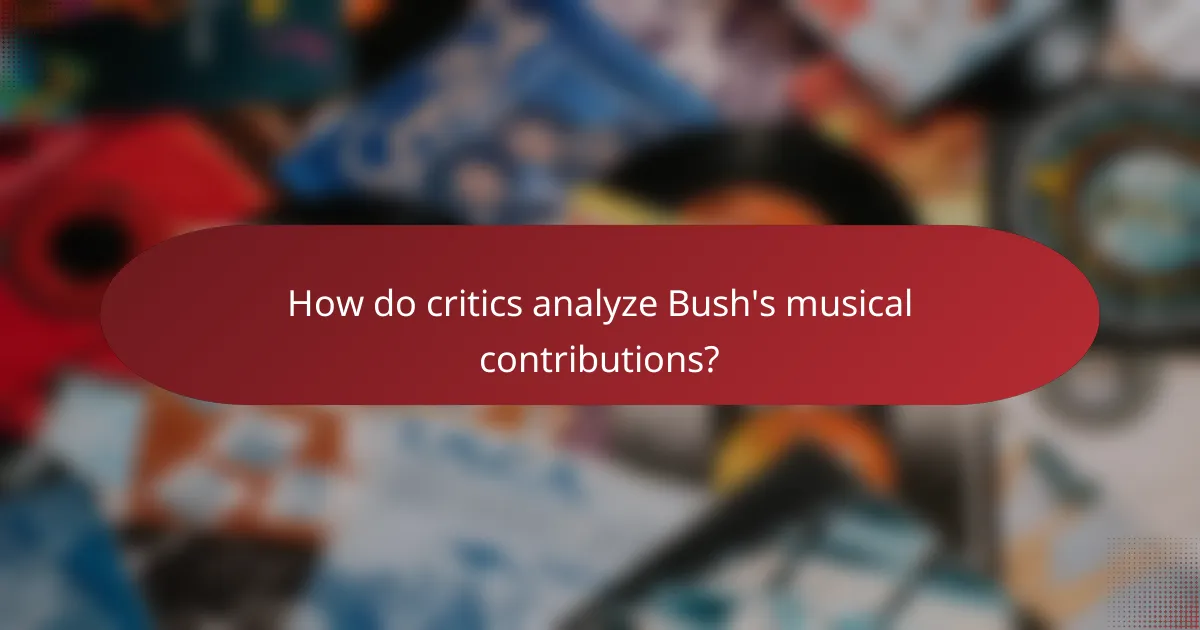
How do critics analyze Bush’s musical contributions?
Critics analyze Bush’s musical contributions by examining their lyrical content, production quality, and overall impact on the rock genre. They often highlight the band’s blend of alternative rock with post-grunge elements, which resonated with audiences in the 1990s and early 2000s.
Critical reception overview
Bush’s music received a mix of acclaim and criticism, particularly for its emotional depth and sonic experimentation. Albums like “Sixteen Stone” were praised for their catchy hooks and introspective lyrics, while some critics argued that the band’s sound was derivative of other rock acts of the time.
Over the years, Bush has maintained a loyal fan base, which has contributed to a resurgence in interest. Critics often revisit their discography, noting how their sound has evolved while still retaining core elements that define their style.
Comparative analysis with other artists
When compared to contemporaries like Nirvana and Pearl Jam, Bush’s music is often seen as more polished and radio-friendly. While Nirvana’s raw energy and Pearl Jam’s lyrical complexity set them apart, Bush’s melodic approach allowed them to achieve significant commercial success.
In contrast to newer bands, such as Imagine Dragons, Bush’s sound is characterized by a heavier reliance on guitar riffs and less electronic influence. This comparison highlights the shifting landscape of rock music, where Bush’s traditional rock roots stand out against more modern pop-rock hybrids.
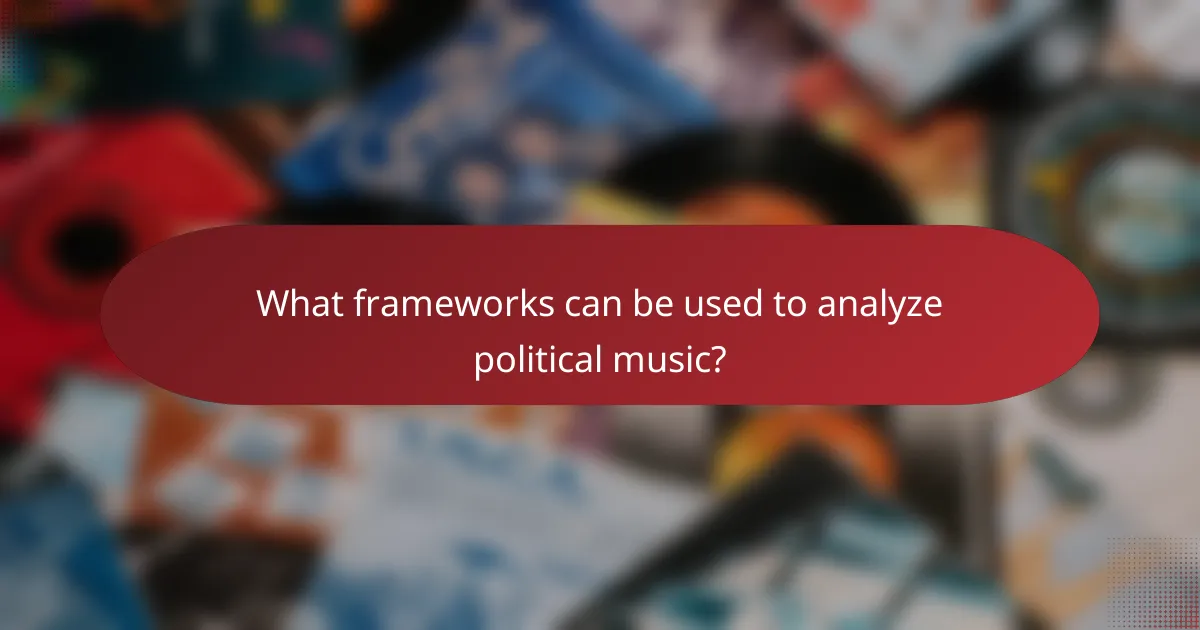
What frameworks can be used to analyze political music?
To analyze political music effectively, frameworks such as lyric analysis methods and cultural impact assessments are essential. These approaches help dissect the messages conveyed through music and evaluate their broader societal implications.
Lyric analysis methods
Lyric analysis involves examining the words and themes within a song to uncover its political messages. This can include identifying rhetorical devices, metaphors, and emotional appeals that resonate with listeners. For instance, analyzing the use of repetition can reveal how certain ideas are emphasized to provoke thought or action.
Consider categorizing lyrics by themes such as protest, identity, or resistance. This can help in understanding how different songs relate to specific political movements or historical contexts. Additionally, comparing lyrics across different artists or genres can highlight varying perspectives on similar issues.
Cultural impact assessment
Cultural impact assessment evaluates how political music influences society and public opinion. This can involve studying the reception of songs in various demographics and the subsequent actions taken by listeners, such as participation in protests or shifts in voting behavior. Surveys and social media analysis can provide insights into these trends.
When assessing cultural impact, consider the historical context of the music and its timing relative to political events. For example, songs released during significant elections or social movements often gain traction and can mobilize communities. Tracking chart performance alongside political events can also reveal correlations between music and societal change.
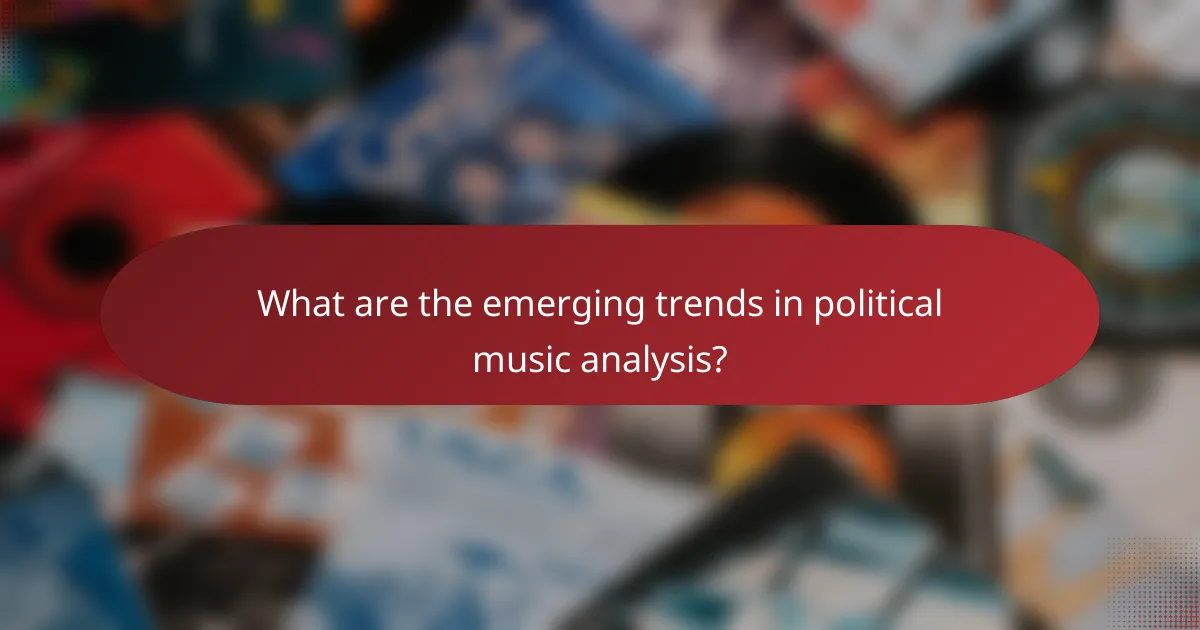
What are the emerging trends in political music analysis?
Emerging trends in political music analysis focus on the intersection of music and social movements, highlighting how artists use their platforms to influence public opinion and mobilize action. Key trends include the rise of digital distribution, the impact of social media on music promotion, and the increasing importance of genre diversity in political messaging.
Digital platforms for music distribution
Digital platforms have revolutionized how political music is distributed, allowing artists to reach global audiences without traditional gatekeepers. Services like Spotify, Apple Music, and SoundCloud enable musicians to upload and share their work directly, often leading to quicker dissemination of politically charged messages.
Artists can leverage these platforms to create playlists that resonate with current events, making their music more relevant. For instance, during election cycles, many musicians curate collections that reflect their political views, helping listeners engage with the issues at hand.
However, artists should be mindful of the algorithms that govern these platforms, as they can influence which songs gain traction. Engaging with listeners through social media and promoting their music actively can help ensure their political messages are heard.



